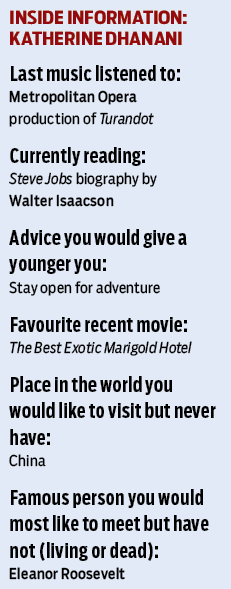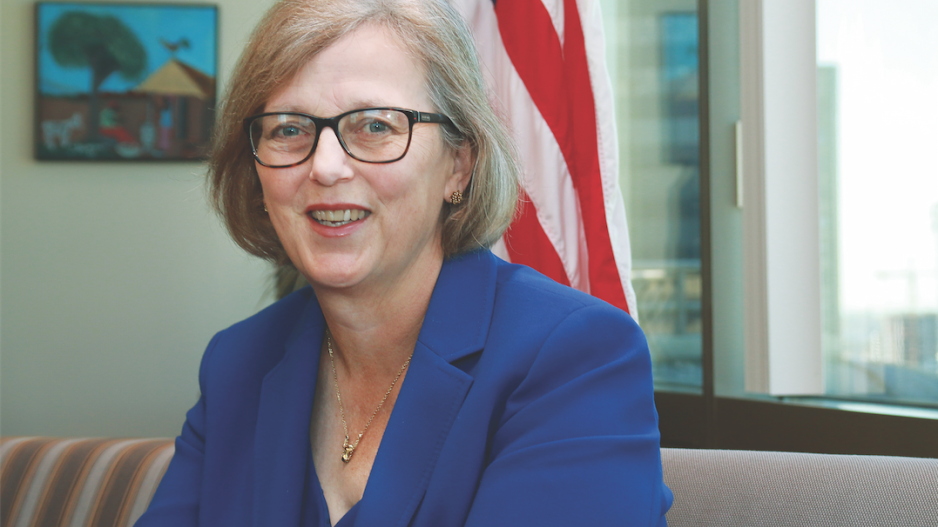U.S. Consul General for B.C. and Yukon Katherine Dhanani peers out of her office to the North Shore mountains. She has been in her post for about a month but is still awestruck by the region’s beauty.
“When I come into this office in the morning sometimes and the sun is shining there on the water, I’ll go, ‘Ahhh,’” she said with a sigh, while enjoying the expansive view that includes Stanley Park, part of the downtown peninsula and glimpses of ships in Burrard Inlet.
“It takes my breath away still. I suspect this is the best view anyone in the State Department has.”
Being the U.S. government’s top-ranking official in the region also comes with the perk of living in a large Shaughnessy mansion, which the U.S. government has owned for generations and is now renovating.
Dhanani’s arrival in Vancouver might also be smoother than it was for some of her predecessors because she is the first U.S. consul general to B.C. and Yukon in many years, perhaps ever, to have an extended family waiting to greet her.
The previous four U.S. consuls general who moved to Vancouver to serve the standard three-year stint in the post moved to the city without having any family ties in the Lower Mainland.
Dhanani’s husband, Azim Dhanani, has aunts, uncles and cousins who live here. His late mother lived in Burnaby.
Some relatives told Business in Vancouver how much they are honoured to have a relative serve in such a high-level diplomatic post.
“She is the most gentle and honourable person,” said Itbar Merali, who is Azim Dhanani’s uncle. “She treats everybody so well.”
His wife, Nasim Merali, concurred.
Dhanani oversees a team of approximately 190 people who are a mix of Canadians and Americans and include consular staff as well as secret service agents and border security agents.
Many see the consulate’s role as the place people go if they need a visa to enter the U.S. or a place Americans go if they lose their passports. But, although the consulate’s commercial division moved to Calgary many years ago, the consulate helps facilitate cross-border business opportunities. Public affairs employees identify opportunities for American speakers to come to Vancouver to engage with audiences.
And law enforcement personnel work with their Canadian counterparts to thwart potential terrorist threats and keep the border secure.
At 59, Dhanani has plenty of diplomatic experience that has prepared her for the job.
The Massachusetts native’s last position was in Washington, D.C., in the State Department’s office of career development and assignments.
Knowing people in that department, where decisions are made for where diplomats are posted, certainly did not hurt her chances of getting the coveted Vancouver gig.
“I guess it can hurt if you really screwed up,” she added with a laugh.

More than a dozen years of Dhanani’s life, however, have been spent serving the U.S. government in five different countries in Africa. She also served as consul general at the U.S. consulate in Hyderabad, India, and had an early career stint as an economic officer at the U.S. embassy in Mexico City.
All that hopscotching around the globe would not have happened had Dhanani followed her original career goal: to be a tenured professor at a small college.
She taught economics in the 1980s at Iowa’s Grinnell College while completing a PhD at the Massachusetts Institute of Technology (MIT).
Then she had second thoughts.
“One of the decisions I made was that I didn’t want to stay in this one place,” she said. “The reward of tenure and having that kind of security and continuity wasn’t what I wanted for my life.”
It was a fateful realization and a watershed moment that coincided with U.S. government posters plastered around campus urging students to take the foreign-service exam.
Dhanani switched her focus, passed the exam and decided not to finish her PhD dissertation, ending up instead with a masters of science degree, which is what she calls a “consolation prize,” from MIT.
She never looked back and has enjoyed a life filled with opportunities to learn new things, although she admits that moving can cause anxiety.
“Moving is stressful,” she said. “My husband and I joke that he knows that I’m going to be a little bit on edge for the last couple of months of a post when I’m getting ready and figuring out what to pack and to send here and there, and in the first couple of months in a new place, when getting settled in. Stress and excitement are related. It keeps you vital and young.”
Diplomatic service postings are traditionally three years, although diplomats’ initial posts are often for two years. Diplomats can apply for as many as 10 jobs, sometimes more if it is at the senior level, so diplomats have some say in where they end up.
Dhanani turned down the opportunity to be the ambassador in Somalia for “personal reasons” several years ago.
“Every place has been wonderful, and I’ve really enjoyed my whole career,” she said. “I would say that the overall experience that tugs my heart the most – I don’t know if you’d call it a favourite – was my tour in Zimbabwe [between 2007 and 2010].”
She describes her stint as deputy chief of mission in Zimbabwe as being the most difficult time in that country’s modern history because “President [Robert] Mugabe completely destroyed the economy” by excessively printing money.
The country went through a time when inflation was in the quadrillions, Dhanani said.
“They took 12 zeros off the currency and within nine months it was worthless.”
While in Harare, she observed what she called a “terror campaign” that Mugabe implemented after he failed to win a victory in the first round of the 2008 election.
Presumed political opponents were tortured and their homes were burned, she said.
The U.S. ambassador at the time, James McGee, led a convoy of diplomatic vehicles to one of the country’s “torture camps” and had confrontations with armed guards at the entrance, Dhanani said.
He was able to look at a book with a list of names of people inside the camp and then he shared that information with Zimbabwe’s neighbours, which tried to get Mugabe to operate more democratically.
While Vancouver’s political and economic culture is drastically different from Zimbabwe’s, Dhanani was surprised by similarities between Vancouver and Hyderabad, India.
“Hyderabad was a cultural hub,” she said. “It is a diverse place, and I came here and saw some of the same companies and issues here. There’s Microsoft, Google, Deloitte – a lot of the big companies in the technology area seem to be present here as well as there.” •




